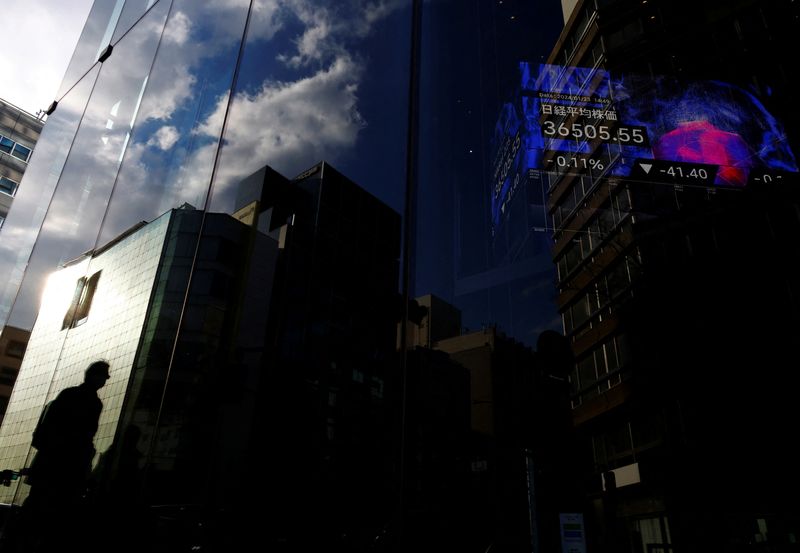By Alden Bentley
A look at the day ahead in Asian markets by Alden Bentley.
Judging by Wall Street's surge Monday, the exit of President Joe Biden from November's election was a relief but also a wash in that it both adds and removes dreaded uncertainty.
To the extent Biden's decision was a trading factor, we might be seeing equal parts enthusiasm for presumptive Democratic nominee Vice President Kamala Harris running on the strong Biden economy, and a modified Trump trade because the former president still leads in the polls, albeit by less than he did than against Biden, according to politics monitoring site PredictIt.
It's too early to have much bearing on Asia trading and anyway anticipation of Fed easing and a deluge of U.S. company results are more immediately salient 3-1/2 months before Americans head to the polls.
Earnings are the focus until later in the week, especially with mega caps Alphabet (NASDAQ:GOOGL) and Tesla (NASDAQ:TSLA) reporting after the bell on Tuesday. Macro wise, the first read on Q2 U.S. GDP comes Thursday and the Personal Consumption Expenditures Price Index on Friday, both seen as pivotal to any Fed decision. Markets see a 25 basis point cut in September as a near certainty.
Conversely, markets seemed unprepared for China's lowering of short- and long-term interest rates on Monday. Investors treated it as more of a desperate act than confidence builder, emphasizing how weak the second largest economy was.
Chinese blue chips slipped 0.9% along with the yuan. MSCI's broadest index of Asia-Pacific shares outside Japan .MIAPJ0000PUS closed 0.61% lower, having shed 3% last week.
If the Nikkei 225 followed its U.S. peers down 1.16% on Monday, led by tumbling chip-related stocks, then Nvidia (NASDAQ:NVDA)'s surge could shore up sentiment for Tuesday. Reuters reported it was working on a version of its new flagship AI chips for the China market that would comply with U.S. export controls.
Magnificent Seven stocks that had weighed heavy last week such as Alphabet, Meta Platforms (NASDAQ:META) and Tesla also stormed back.
Overall, U.S. earnings growth so far looks even better than heightened expectations going into the reporting season. Based on the 74 S&P 500 companies that had reported results as of Friday, LSEG raised its estimate for year-over-year growth to 11.1% from 9.6% 10 days ago.
The S&P 500 ended 1.08% higher and the Nasdaq 1.58% higher, led by tech. Energy, one of the big Trump plays, was the worst performing sector. There was some analysis that bets could be scaled back on victory for Republican Trump that would increase U.S. fiscal and inflationary pressures. Markets could also think an increased chance of a divided government under the next administration is a good thing.
There is no clear cut election dollar play, absent a specific call for a strong (or weak!) dollar from one of the candidates. Still, expectations that Trump as president would cut taxes and raise tariffs added support to the dollar index. But that works against Japanese policy goal of strengthening the yen and dollar/yen was slightly lower at 157.10 in late trade.
Here are key developments that could provide more direction to markets on Tuesday:
- Japan flash PMI (July)

- Taiwan jobless rate (June)
- S Korea PPI (June)
- Singapore CPI (June)